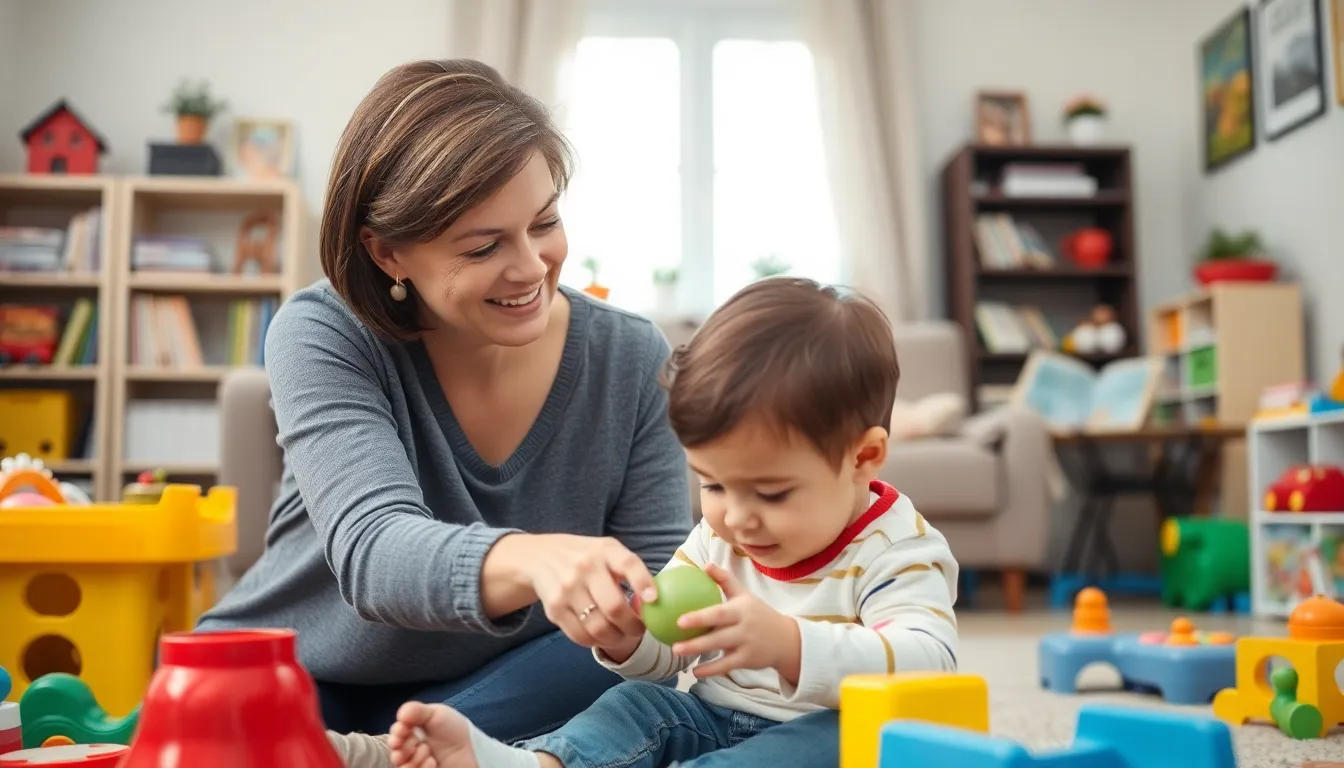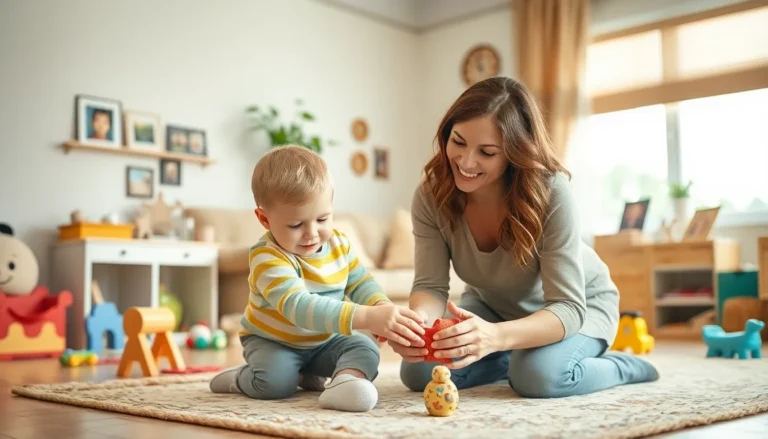Table of Contents
ToggleNavigating the world of parenting can feel like trying to solve a Rubik’s cube blindfolded. Among the many terms that pop up, “solo parenting” and “single parenting” often get tossed around like confetti at a parade. While they might sound like synonyms, they’re actually two distinct experiences that carry their own unique challenges and triumphs.
Overview of Parenting Structures
Parenting structures define the various ways individuals take care of children. These structures often influence the experiences of caregivers. In the context of parenting, two terms commonly arise: solo parenting and single parenting.
Solo parenting refers to raising children without the support of a partner. This situation can occur voluntarily, meaning a person chooses to parent alone, or through circumstances, such as a separation. Solo parents manage all aspects of child-rearing, from financial obligations to decision-making, often facing significant challenges.
Single parenting, on the other hand, typically emerges from divorce or separation. These parents may receive support from their ex-partners or extended family, which distinguishes single parenting from solo parenting. In many cases, the presence of shared responsibilities can alleviate some burdens for single parents.
Both parenting structures encompass unique challenges. Solo parents often navigate isolation and a lack of community support. Single parents frequently struggle with co-parenting dynamics and balancing communication with ex-partners. Each structure creates distinct environments for children, impacting their development and emotional well-being.
Support systems enhance parenting experiences. Solo parents might seek help through friends, family, or support groups, while single parents may rely on their co-parent or extended family for assistance. Understanding these structural differences helps clarify parenting experiences and demonstrates that both solo and single parents demonstrate resilience in their journeys.
Difference Between Solo Parenting and Single Parenting

Solo parenting and single parenting represent distinct experiences in raising children. Understanding these differences helps clarify the unique challenges faced by each type of caregiver.
Definitions and Concepts
Solo parenting involves raising children without any partner support. This situation can stem from personal choice or unexpected circumstances like separation. Caregivers often take on all responsibilities alone. Conversely, single parenting frequently arises after divorce, where one parent may still receive support from the other parent or extended family members. The dynamic between parents can influence the overall parenting experience significantly.
Key Distinctions
Solo parents manage every aspect of child-rearing independently, which can lead to feelings of isolation. Many struggle to find community resources and supportive networks. Single parents, however, often face co-parenting relationships that require negotiation and communication with their ex-partners. This arrangement can provide some support but also introduces challenges related to conflict and coordination. Ultimately, both parenting types shape children’s environments differently, impacting their emotional and developmental experiences.
Challenges Faced by Solo Parents
Solo parents encounter various challenges that significantly impact daily life. They often face emotional and physical demands that require immense strength and resilience.
Emotional and Physical Demands
Emotional exhaustion frequently affects solo parents due to the high levels of responsibility. Managing work, household duties, and children’s needs stretches their emotional resources thin. Physical fatigue also plays a critical role, as tasks like cooking, cleaning, and childcare can become overwhelming without support. Stress from multitasking often accumulates, leading to burnout if self-care is neglected. Frequent feelings of isolation may arise, making it essential for solo parents to actively seek connections.
Support Systems
Support systems significantly influence a solo parent’s experience. Friends often provide emotional support, yet finding ample time to connect remains challenging. Community resources, such as parenting groups or local organizations, can offer valuable assistance. However, access to such resources may vary widely depending on location. Building relationships with other solo parents creates a sense of camaraderie and shared understanding, which helps mitigate feelings of loneliness. Engaging with online forums or social media platforms can also furnish key support avenues for solo parents.
Challenges Faced by Single Parents
Single parents encounter various challenges that can impact their daily lives and parenting experiences.
Financial Considerations
Financial strain presents a significant challenge for many single parents. Managing household expenses on a single income often leads to budgeting constraints. Childcare costs, required for maintaining employment, can further complicate finances. In many cases, single parents may need to work multiple jobs, which reduces time spent with children. Many families face the risk of falling below the poverty line, which stresses both parents and children. Support options like government assistance programs and community resources can alleviate some financial burdens, but navigating these systems can be daunting.
Co-Parenting Dynamics
Co-parenting dynamics introduce another layer of complexity for single parents. Effective communication with an ex-partner is essential for child welfare. Disagreements often arise about parenting styles, discipline, and decision-making. Some single parents experience tension with their former partner, which can adversely affect children’s emotional health. It’s vital to establish boundaries and focus on the child’s best interests. Collaborative parenting plans help create consistency for children. Engaging in mediation or family counseling can facilitate better interactions between co-parents, promoting a healthier environment for children.
Benefits of Both Parenting Styles
Solo parenting offers opportunities for independence and personal growth. Solo parents often cultivate strong problem-solving skills as they navigate child-rearing on their own. They may develop a genuine sense of accomplishment from managing all aspects of their children’s lives.
Single parenting also has its advantages. Many single parents benefit from shared responsibilities with their co-parent, facilitating a more balanced approach to childcare. Flexible arrangements with an ex-partner can provide both support and time for self-care.
Both parenting styles foster resilience in children. Children raised by solo parents learn adaptability and self-sufficiency early on. Similarly, kids in single-parent households often gain maturity through understanding complex family dynamics.
Connections can form through community resources. Solo parents may seek out support groups for shared experiences, reinforcing their network. Single parents often benefit from engaging with extended family, creating a broader support system that alleviates some stress.
Financial aid can play a role as well. Solo parents may find assistance programs tailored for their circumstances, helping with budgeting and essential resources. Single parents often access help through government support and community programs, addressing immediate financial concerns.
These parenting styles allow for unique bonding opportunities. Solo parents might enjoy uninterrupted quality time with their children, fostering deep connections. Single parents can also establish their own family traditions, navigating the journey together with their kids.
Overall, understanding the benefits of both solo and single parenting highlights their strengths and supports effective child-rearing practices. Each style enriches the family dynamic in distinct ways, ultimately influencing children’s growth and development.
Solo parenting and single parenting each present unique challenges and rewards that shape the experiences of both parents and children. Understanding these distinctions is essential for recognizing the varied dynamics at play in each situation. While solo parents often navigate their journey independently, single parents may benefit from shared responsibilities and support systems.
Both paths foster resilience in children and encourage personal growth in parents. By acknowledging the specific needs and strengths inherent in each parenting style, caregivers can better equip themselves and their children for a successful and fulfilling life. Embracing the differences can lead to stronger connections and healthier environments for families.







